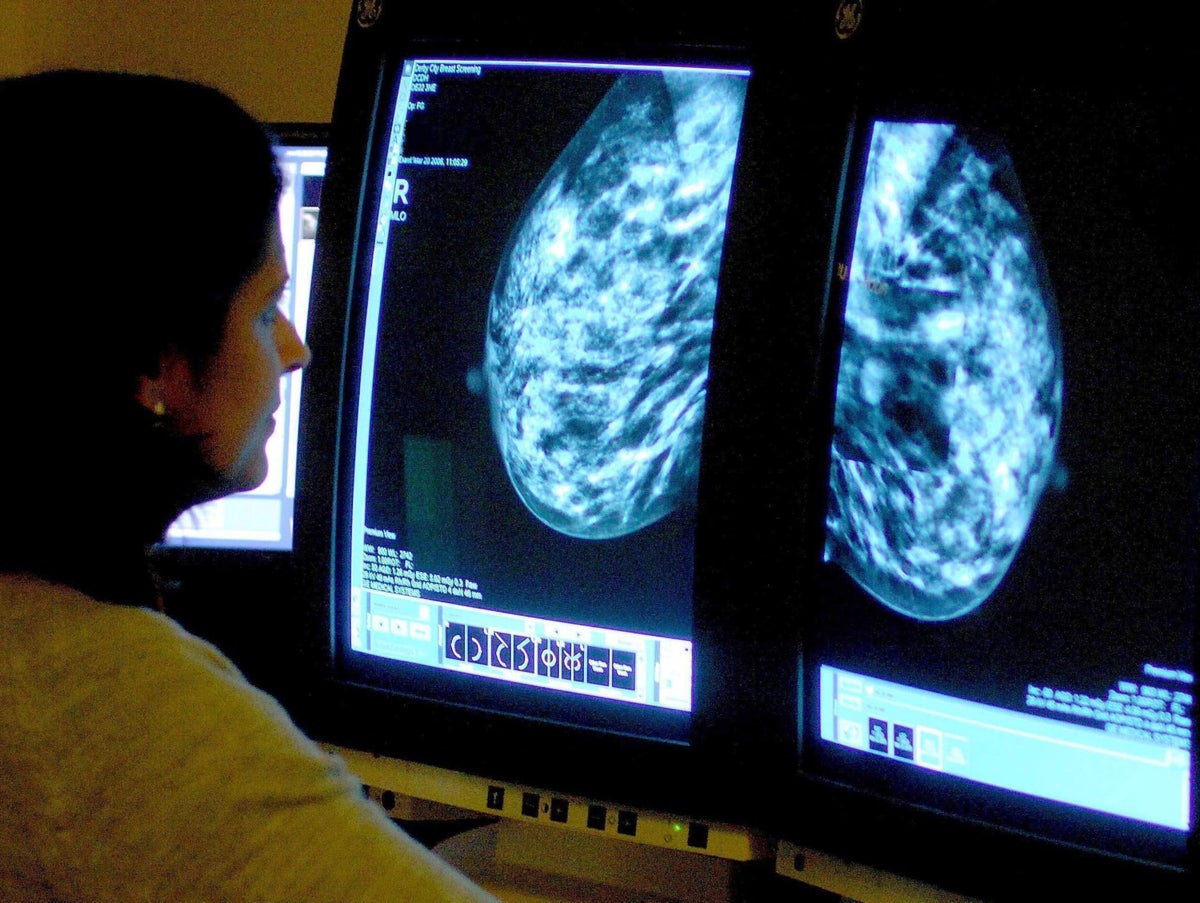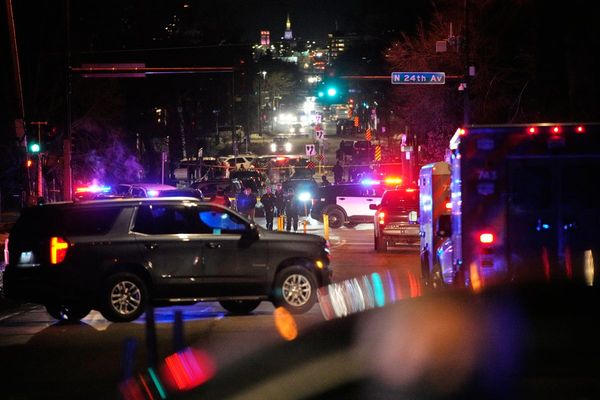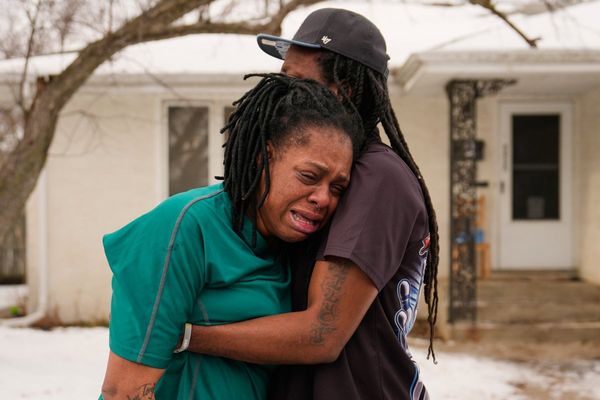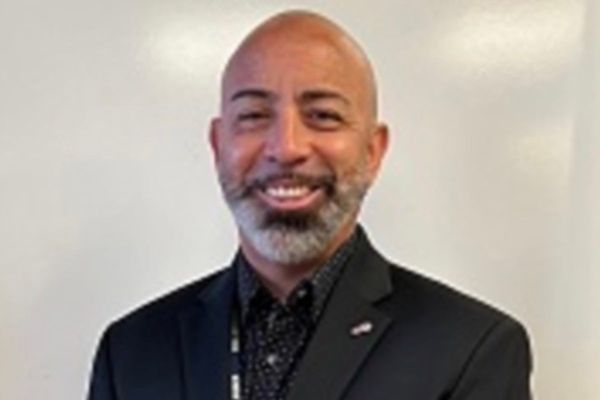
The UK is facing a crisis in breast cancer care as a massive shortage of specialist doctors and nurses triggers dangerous delays in treatment for thousands of women, top doctors have warned.
Oncologists say some parts of the country have seen a “complete collapse” of the service – with the situation set to get worse as the number of patients outstrips capacity.
Professor Andrew Wardley, chair of the Association of Cancer Physicians, told The Independent that the provision of breast cancer treatment has been “hard hit”. “Because of demand, it has suffered considerably, and there are areas of the country where there are no breast oncologists,” he said.
“We’re losing people from the NHS all the time; there are lots of reasons why, and no immediate solution. Things will get worse before they get better.”
The stark warning comes as new figures show that treatment delays have surged among breast cancer patients, with 1,062 people forced to wait longer than the 31-day target to be seen, compared with 954 a year earlier. Meanwhile, 1,273 patients across the country waited for more than 62 days to be seen – despite more than 800 of these being deemed “urgent” referrals – up from 1,121 a year earlier.
The crisis has been prompted by a “perfect storm” of low staffing and increased demand, The Independent has been told, with contributing factors including:
- A rise in the number of new treatments for cancer approved by the NHS medicines watchdog
- A lack of pharmaceutical specialists available to make up these vital drugs, as recruitment to complex, high-pressure roles has become difficult
- A surge in breast cancer radiologists and oncologists planning to leave the NHS in the next five years
- A drop in the number of breast cancer doctors working full-time in the UK
- The majority of breast radiology posts remaining unfilled for more than 12 months in 2022
Professor Wardley highlighted Sheffield, Dundee and Glasgow as cities where the service is already in dire straits, but said most areas of the country are suffering from “massive shortages”. NHS Greater Glasgow and Clyde denied there are problems with its services.
“Sheffield is an area where there has been a complete collapse of the breast cancer care system – where they’ve had to set up two large hubs and bring in people from outside to fill the gap,” said Prof Wardley.
“Dundee had no breast oncologists for a while; Glasgow was unable to deliver some highly effective treatments. But I think if you go anywhere in the country, apart from London or Manchester, you’ll find there’s massive shortages.”
Board papers for Sheffield Teaching Hospitals NHS Trust in July revealed that a review of breast cancer services had warned that the situation was “fragile”, with an “at risk” workforce, and was likely to deteriorate further.
Oncology specialists from four key professional bodies – the Association of Cancer Physicians, the UK Oncology Nursing Society, the British Oncology Pharmacy Association (Bopa) and the Royal College of Radiologists – have written to health secretary Victoria Atkins over the wider issue of staffing levels across oncology services not matching demand.
Fragile services
The latest figures, for October, show that the NHS is failing on key breast cancer treatment waiting times, with just 65 per cent of people treated within 62 days against a target of 85 per cent.
According to the cancer charity Macmillan, 60,000 people could live for six months longer if the NHS were to hit its national targets.
Claire Coxsell waited nearly three months for treatment after being diagnosed with grade 3 breast cancer— (Macmillan)
Claire Coxsell, 35, from Portsmouth, who has been supported by the charity, waited nearly three months for treatment after being diagnosed with grade three breast cancer this year, despite being told she was a priority.
“It feels like I’m having to fight for a chance to have a life; a few days’ delay feels like years,” she told The Independent. “The NHS staff have been great. I feel sorry for them, as you can see they are frustrated with operating in a saturated system.”
She said the scans and surgery had happened very quickly – but the life-saving chemotherapy had not.
“No one could control me getting cancer – but someone could control how quickly I was seen, to hopefully prevent it spreading and give me the best chance of life. It was devastating to know that the cancer might be spreading while I was waiting; I couldn’t do anything about it.”
According to figures from the Royal College of Radiologists, all cancer specialisms saw a slight rise in the number of clinical oncologists last year, except for breast cancer, where there was a slight drop from 244 to 242 despite a surge in demand.
The number of consultant radiologists specialising in breast cancer has also remained static, with the number of vacancies in these specialist roles now at 9 per cent compared with 7 per cent for cancer overall.
Meanwhile, almost a quarter of the consultant clinical radiologists who specialise in breast cancer plan to retire within five years, compared with 19 per cent across all services. At the same time, 60 per cent of the breast radiology posts that were vacant last year in England remained unfilled for more than 12 months.
On the wider cancer staffing crisis, Mark Foulkes, a past president of the UK Oncology Nursing Society, told The Independent: “There’s a shortage of doctors, specifically oncologists and haematologists, to prescribe these drugs. Secondly, there are not enough pharmacists to make the drugs up and deliver them, and thirdly, there are not enough nurses to deliver them.
“We know that our patients are suffering as a result of workforce capacity, and so are our [nurses].”
Dr Tom Roques, chair of the cancer network radiotherapy group for the Royal College of Radiologists, added: “The number [of cancer doctors] is going up a little bit, but the number of breast cancer doctors is going down year on year. So there is a particular problem with people choosing to be breast cancer doctors rather than [specialising in] lung or prostate cancer, for example.”
Dr Roques said that stretched cancer treatment services are having to prop up other services, with doctors and patients travelling to other hospitals to provide and receive care, prompting “unacceptable” waiting times.
Prof Wardley said the issue is caused by breast cancer “leading the way” with the number of new treatments, as well as the increased length of time people stay under NHS care as death rates fall.
He said NHS England has been working to address the issue, but that the crisis across cancer care has been “20 years in the making” because of a lack of planning around staffing levels, which have not kept pace with treatments.
Between July 2021 and August 2022, 63 new cancer treatments were approved by the National Institute for Health and Care Excellence (NICE). Since 2018, 15 new breast cancer medicines have been approved by the regulator.
According to a November report from the UK’s Systemic Anti-Cancer Therapy Board, demands for treatments are increasing at a rate of 5 to 6 per cent each year, and drug preparation services are “severely challenged”.
Claire Coxsell: ‘It was devastating to know that the cancer might be spreading while I was waiting’— (Macmillan)
Joseph Williams, the chair of Bopa, told The Independent there was a “perfect storm” across specialist drug-making units, whose services are closing because of a lack of staff and buildings that are not fit for purpose.
He said: “We are worried that you might not be able to give patients the treatment in a timely manner, or if medicines can't be compounded and made on time, due to many different factors – that perfect storm of factors – then patients will be delayed.”
A Department of Health and Social Care spokesperson said the NHS has treated record numbers of patients over the last two years. It added that its Major Conditions Strategy will improve cancer prevention, diagnosis and treatment.
Sheffield Teaching Hospitals NHS Trust, NHS Tayside and NHS Greater Glasgow and Clyde were approached for comment.







